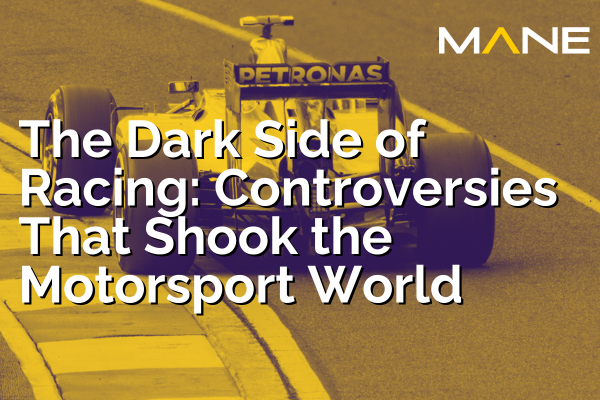The Dark Side of Racing: Controversies That Shook the Motorsport World
18 Nov, 20242minsThe Dark Side of Racing: Controversies That Shook the Motorsport WorldBehind the glamour and...

The Dark Side of Racing: Controversies That Shook the Motorsport World
Behind the glamour and thundering engines of motorsport lies a shadowy world of scandals that have rocked the racing community to its core. From calculated deception to financial fraud, these controversies remind us that even in the pinnacle of racing, human fallibility and greed can taint the sport's pristine image.
Crashgate: The Engineered Accident
Perhaps one of the most calculating scandals was the infamous "Crashgate" controversy of 2008. Renault F1 orchestrated an elaborate scheme where driver Nelson Piquet Jr. was instructed to deliberately crash his car during the Singapore Grand Prix, triggering a safety car that would advantage his teammate Fernando Alonso. When the truth emerged a year later, it led to lifetime bans for team officials and deeply damaged the sport's credibility.
Spygate: Industrial Espionage at Its Finest
In 2007, Formula 1 was rocked by "Spygate" - a scandal involving McLaren and Ferrari. A senior McLaren engineer was found in possession of a 780-page dossier of Ferrari's confidential technical information. The price tag for this industrial espionage? A record-breaking $100 million fine for McLaren and their exclusion from the Constructors' Championship.
The Financial Fraudsters
Beyond the track, motorsport has seen its share of financial scandals. Scott Tucker, a sports car team owner, was arrested for running a $419.8 million payday lending scheme, using racing as a front for his illegal activities. Greg Loles, co-owner of Farnbacher Loles, orchestrated a Ponzi scheme that defrauded church parishioners of $27 million.
From Racetracks to Drug Trafficking
Some scandals ventured into more dangerous territory. Former IMSA champion Randy Lanier served time for drug smuggling, while British Touring Car Championship entrant Vic Lee used his team's nitro gas cylinders to smuggle cocaine worth £6 million. Even more shockingly, Lee repeated the same crime after his release.
The Monaco Manoeuvre: Schumacher's Rascasse Scandal
In 2006, Michael Schumacher's reputation took a hit when he deliberately parked his Ferrari at Rascasse corner during Monaco GP qualifying, preventing other drivers from completing their final flying laps. The stewards saw through the ruse, stripped him of pole position, and sent him to the back of the grid. It was a stark reminder that even legends aren't immune to controversy.
The Great Tyre War
The 2003 Tyre-Gate scandal highlighted how technical regulations could be exploited. Michelin-shod teams found themselves in hot water when their tires were found to expand beyond permitted width during races. A mid-season clarification forced these teams to redesign their tires, effectively handing an advantage to Bridgestone teams, particularly Ferrari.
BAR-Honda's Fuel Folly
In 2005, BAR-Honda's ingenuity crossed the line when they were caught running cars under the minimum weight limit using a hidden fuel compartment. The deception earned them a disqualification from the San Marino GP and a two-race ban, severely damaging the team's credibility.
Abu Dhabi 2021: The Title Decider
The 2021 season finale in Abu Dhabi became one of F1's most controversial moments. The handling of safety car procedures in the final laps, which effectively decided the World Championship between Hamilton and Verstappen, sparked intense debate and led to major changes in race control procedures.
The Singapore Sling: Race Fixing Chronicles
The 1990s saw multiple instances of race fixing come to light, with teams manipulating pit stops and race strategies. These revelations led to stricter monitoring of team communications and race control procedures.
McLaren's Moment of Dishonesty
In 2009, McLaren-Honda found themselves embroiled in controversy when they were caught lying to stewards about a race incident. The deception led to the dismissal of sporting director Dave Ryan and significantly damaged the team's reputation in the sport.
The Art of Team Orders: When Drivers Were Told to Throw Races
While technical and financial scandals grabbed headlines, some of motorsport's most controversial moments revolved around teams manipulating their drivers' race positions. These incidents, though sometimes subtle, struck at the very heart of racing integrity.
Ferrari mastered the art of controversial team orders. At the 2002 Austrian Grand Prix, they orchestrated perhaps the most blatant position switch in F1 history, with Rubens Barrichello ordered to surrender victory to Michael Schumacher on the final lap. The public outrage was so severe that Schumacher awkwardly pushed Barrichello onto the top step of the podium. Eight years later, Ferrari's infamous "Fernando is faster than you" coded message to Felipe Massa at the 2010 German Grand Prix earned them a £100,000 fine.
Red Bull faced their own team order scandal with the "Multi-21" saga of 2013. Sebastian Vettel openly defied team instructions (coded as "Multi-21", meaning car #2 Webber should finish ahead of car #1 Vettel) and overtook teammate Mark Webber against explicit orders. The incident created lasting tension within the team and raised questions about driver loyalty versus personal ambition.
Even in modern times, team orders continue to spark debate. Mercedes' instruction to Valtteri Bottas to "Let him by, please" at the 2018 Russian Grand Prix, allowing Lewis Hamilton through, reignited discussions about the role of "number two" drivers in Formula 1.
These incidents led to various rule changes and continue to spark debate about where the line should be drawn between legitimate team strategy and unsportsmanlike manipulation.
Impact and Legacy
These scandals have done more than just tarnish reputations - they've forced motorsport to confront uncomfortable truths about oversight and integrity. While the sport has implemented stricter controls and monitoring, the shadow of these controversies serves as a reminder that eternal vigilance is the price of sporting integrity.
As motorsport continues to evolve, the challenge remains: balancing the competitive drive to win with ethical conduct. While these scandals represent the dark side of racing, they've also led to reforms that have made the sport stronger and more transparent.
What's clear is that beyond the champagne celebrations and podium finishes, motorsport must constantly guard against those who would compromise its integrity for personal gain. The true spirit of racing lies not just in victory, but in how that victory is achieved.



